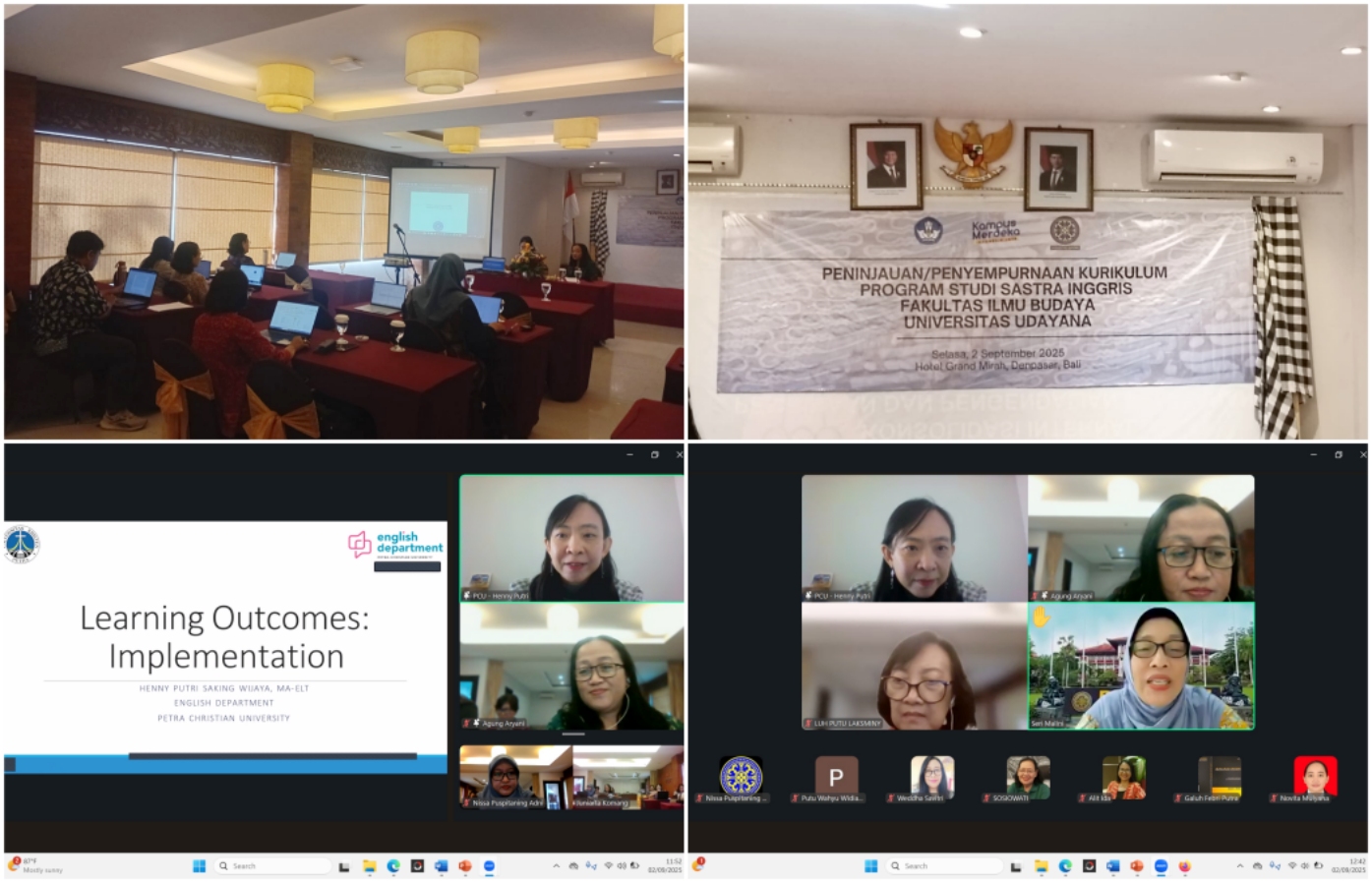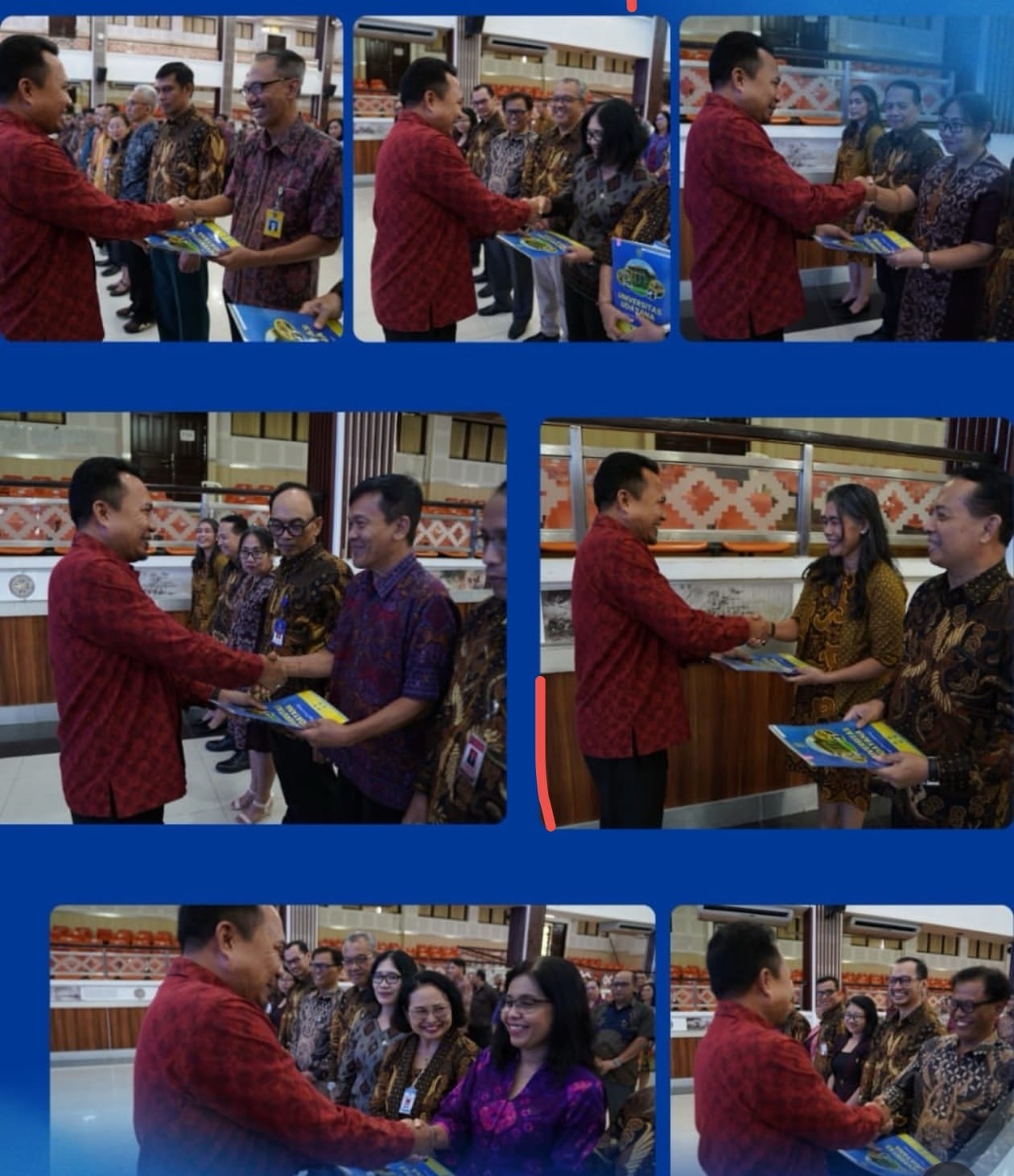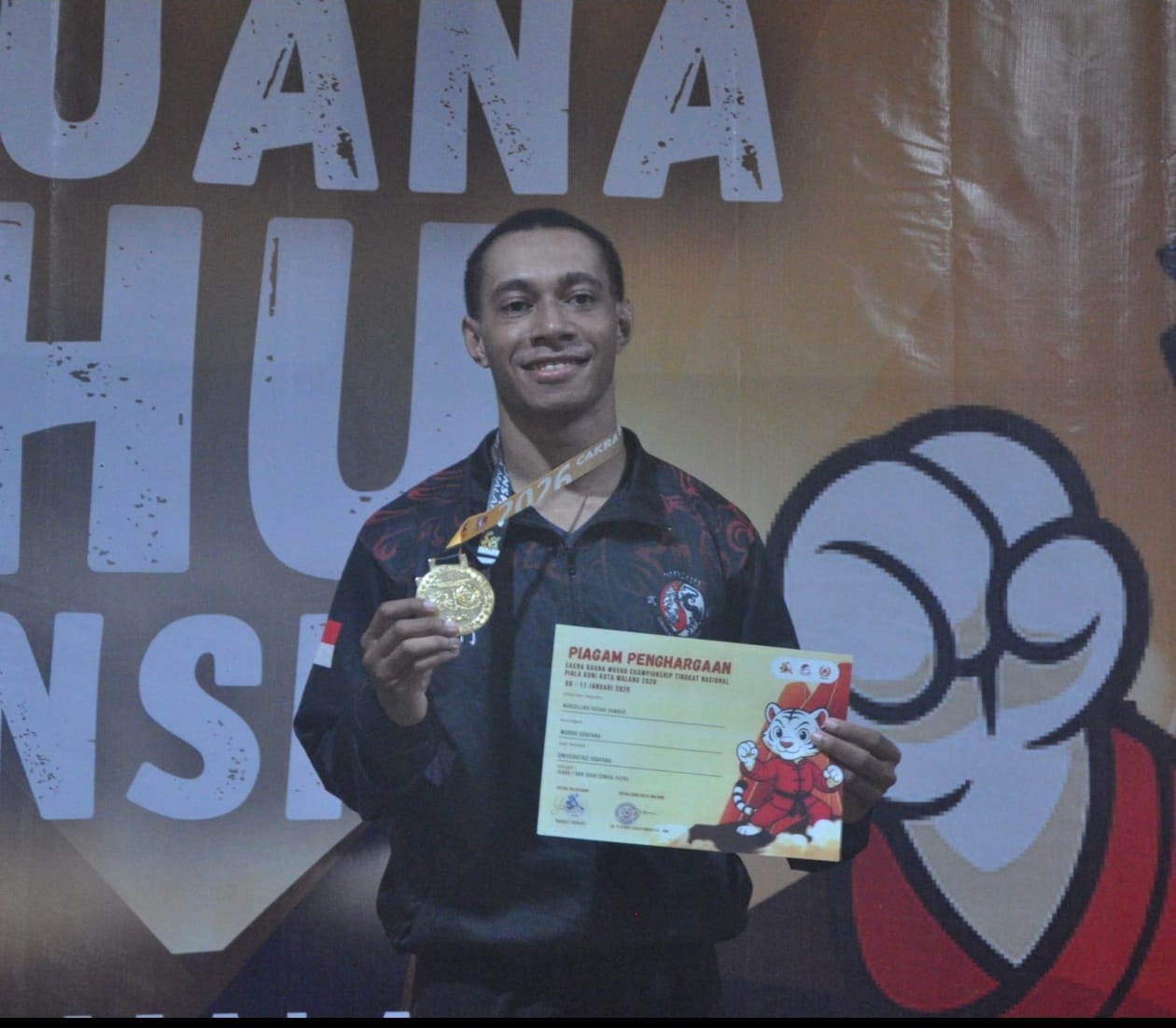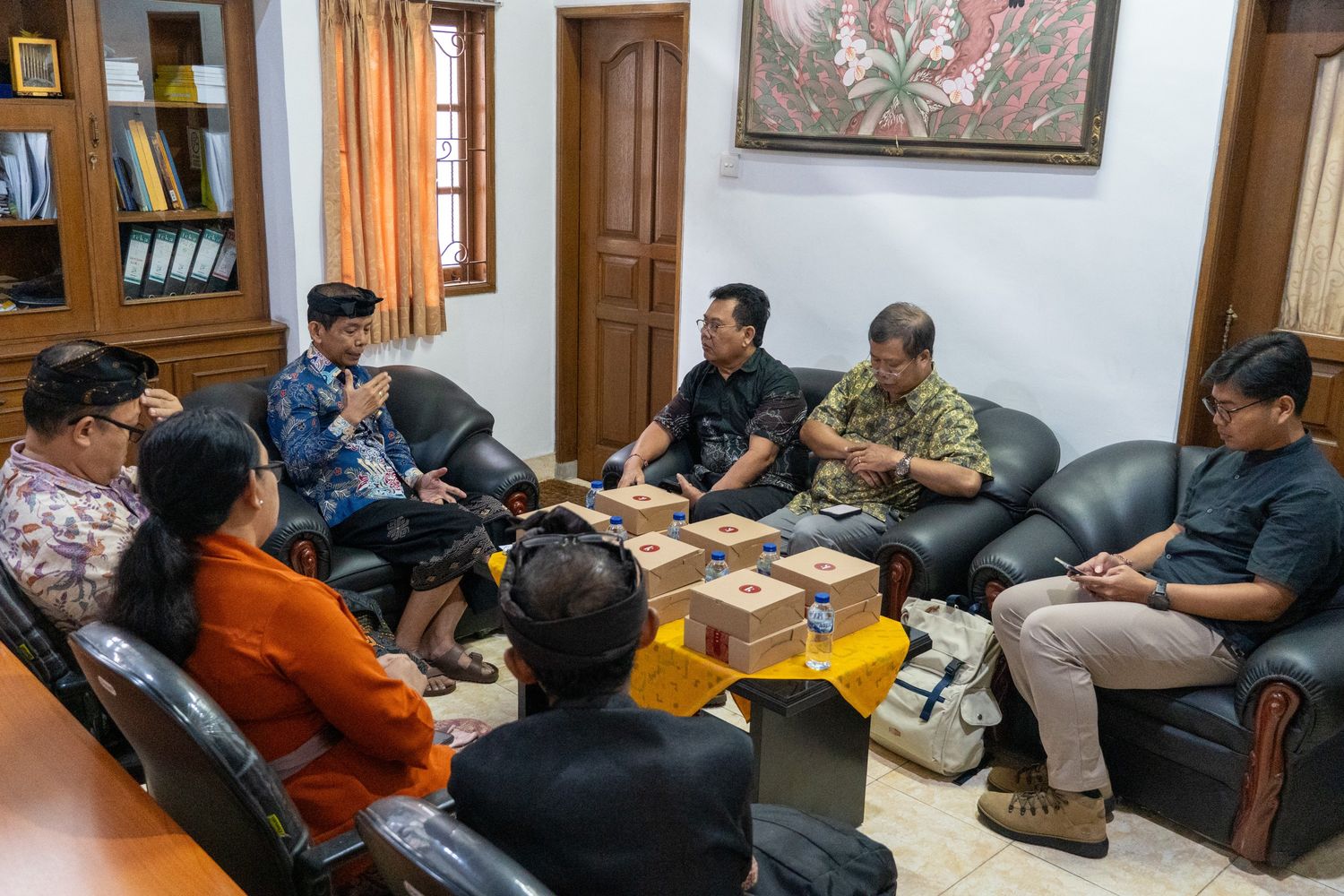Bachelor of Literature, Faculty of Humanities, Udayana University, Holds a 2025 Curriculum Review/Improvement Activity
On Tuesday, September 2, 2025, Bachelor of English Literature, Faculty of Humanities, Udayana University, held a 2025 Curriculum Review/Improvement Activity. The activity was conducted in a hybrid format, via Zoom and offline at the Grand Mirah Hotel in Denpasar, Bali. The event featured both internal and external speakers from Petra Christian University. The event was attended by lecturers from the Bachelor of English Literature, particularly the study program's quality assurance team, Coordinator of Bachelor of English Literature, student representatives, alumni, and stakeholders. The purpose of this activity was to review curriculum development and revise several curriculum documents (such as the RPS) and other documents related to the Internal Quality Assurance System.
The event opened with a report from the committee chair, Prof. Dr. Dra. Luh Putu Laksminy, M.Hum. He said that one of the objectives of this activity was to review the implementation of one of the SPMI elements, namely curriculum improvement by adding new issues related to the curriculum, support for students in the learning process and the implementation of Final Assignments (Thesis and Non-Thesis), as well as assessment methods. The Coordinator of the Bachelor of English Litera, FIB Unud, Prof. Dr. I Wayan Mulyawan, S.S., M.Hum., in his remarks, expressed his appreciation for the team's work that had prepared this activity well even from several months before. He also said that this activity is a routine activity carried out every year and is important to be carried out as part of the study program's evaluation and response to educational developments and regulations, which will later be reflected in curriculum improvements and improvements to the study program's SPMI.
The agenda continued with remarks from the Dean of the Faculty of Humanities, Udayana University, represented on this occasion by the Head of the Education Development and Quality Assurance Unit (UP3M) of the Faculty of Humanities, Udayana University, Dr. Ni Ketut Widhiarcani Matradewi, S.S., M.Hum. In her remarks, she stated that the curriculum is essentially our educational roadmap. In this ever-changing era, the curriculum must be dynamic and responsive to global demands and industry needs. English Literature graduates are expected to master not only theory but also practical skills relevant to current developments, such as digital literacy, creative writing, and reliable translation skills. This will enable us to formulate a curriculum that is not only relevant but also superior and highly competitive. Therefore, this forum is crucial as a space for discussion, exchange of ideas, and collaboration for a brighter future for the study program.
The main activity was divided into two presentation sessions. The first presentation was delivered by an internal speaker from the Bachelor of English Literature, Dr. I Gusti Agung Istri Aryani, S.S., M.Hum. He presented material entitled "The Current Condition of the Bachelor of English Literature Curriculum, Faculty of Humanities, Udayana University". In his presentation, he stated that the curriculum in the Bachelor of English Literature currently applies one curriculum, namely the 2024 curriculum. Based on this, the curriculum adjustments that must be made now are to follow up on the Regulation of the Minister of Education, Culture, Research, and Technology of the Republic of Indonesia No. 53 of 2023 concerning Quality Assurance of Higher Education, especially regarding the Bachelor's Final Project. The Bachelor of English Literature will currently implement two Final Project schemes, namely Thesis and Non-Thesis. The arrangement of the Thesis Final Project remains in accordance with the current regulations, while the Non-Thesis Final Project is regulated according to the specified requirements.
Furthermore, the Bachelor of English Literature curriculum is based on the principles of relevance to job market needs, professionalism, and quality oriented. Therefore, information on admissions to the Recognition of Prior Learning Program is also part of the 2025 Bachelor of English Literature Curriculum Review. Recognition of Prior Learning (RPL) is a significant breakthrough in higher education that allows individuals to receive recognition for their prior learning experiences, whether through interrupted formal education, non-formal or informal education, or work experience. In the RPL program, students can take 70% of the total credits, equivalent to 100 credits. The number of credits recognized (declared passed based on prior learning) is calculated based on the assessment of prospective students' portfolio documents by the Portfolio Assessment Team of the RPL Pathway of the Udayana University English Literature Undergraduate Program.
The second presentation at this event was delivered online (via Zoom meeting) by an external resource person, Henny Putri Saking Wijaya, S.S., MA-ELT. He is the head of the English Literature Study Program at Petra Christian University, Surabaya. She presented a presentation entitled "Best Practices for Assessment of Graduate Learning Outcomes (CPL) and Course Learning Outcomes (CPMK)." In her presentation, she explained how the assessment system for Graduate Learning Outcomes and Course Learning Outcomes is implemented and enforced at Petra Christian University. She explained that the assessment process has been integrated into a single system, allowing lecturers to easily assess and evaluate or review any unmet CPMK. At Petra Christian University, three university CPLs and three study program CPLs are implemented. These CPLs are divided based on criteria, such as whether the course is a skills course or not, and similar factors.
Following the presentation, a discussion and question-and-answer session followed. Several questions and discussions centered on the implementation and weighting of CPMK. The speaker responded to these questions by providing examples of past experiences, such as when CPMK is not met, a review is first conducted to determine whether a course has more than one CPMK, and whether remedial CPMK is required. or not. The discussion session was interactive. Some input and information from the speakers were then used as a reference for the next session. After the presentation session was completed, the final agenda of this activity was the review and refinement of the Curriculum, which included reviewing and adjusting the Study Program Curriculum (Mapping and Improvement of CPMK) and adjusting the Study Program Specifications. The activity was closed by the Coordinator of the Bachelor of English Literature and concluded with the presentation of certificates and a group photo.




UDAYANA UNIVERSITY